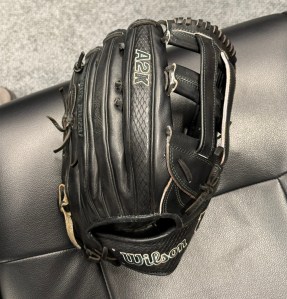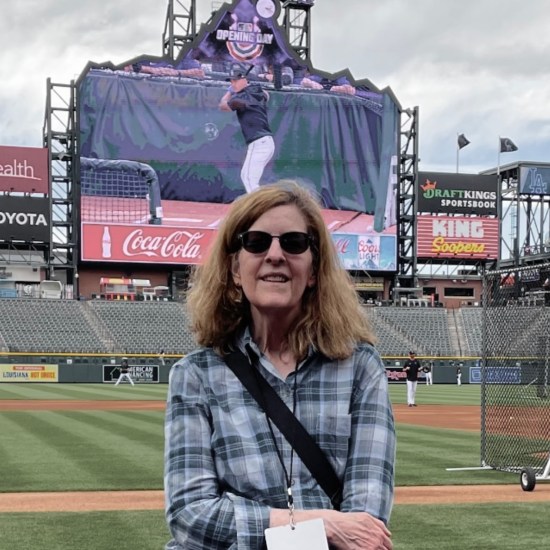Pitcher List Conversations are transcripts of interviews with professional baseball players — and sometimes, players discuss topics other than baseball. This has been lightly edited for clarity.
★ ★ ★
That Brenton Doyle failed to become a household name in 2023, his rookie season, makes sense.
A product of Shepherd University, a D-II institution in West Virginia, he was drafted by the Colorado Rockies in the fourth round of the 2019 draft. His was an unremarkable signing.
Still, the defensive chops and power potential were clear as he made his way through the Rockies farm system. In 2021, he won his first Gold Glove while playing for High-A Spokane. The Rockies called him up early in the 2023 season, and he never looked back.
Despite being, literally, the best outfielder in MLB and winning a Gold Glove for patrolling the most challenging outfield in the game, Doyle’s offensive numbers left much to be desired. He finished with season with a .203/.250/.343 and 45 wRC+. (You read that correctly.)
He’d begun making changes before the end of the 2023 season, and some positive results were visible. Still, it is notoriously difficult to make in-season swing adjustments. Doyle entered the offseason knowing that his offensive game had to improve.
And it has.
Last week, he became the sixth MLB player of 2024 to enter the 20/20 club. Currently, he’s slashing .267/.325/.464 with a 105 wRC+. Meanwhile, his defense remains elite.
I spoke with Doyle about his unusual track to MLB, the offensive changes he’s made, and his favorite catch of 2024.
★ ★ ★
Renee Dechert: Can you talk a bit about your baseball journey? You’re from Virginia. When did you know that baseball was a thing you wanted to do?
Brenton Doyle: From a really young age, actually, baseball was the only sport I really picked up when I was younger. I mean, I would play basketball, football with my friends in the backyard and stuff. But competitive wise and organizationally wise, it was only baseball ever since tee-ball.When I started, I was probably three or four.
RD: What did you love about it?
BD: I don’t know. I guess I loved the team aspect of it, all just pulling for each other. The team sport of it really interested me, and I fell in love with the sport.
RD: You took an unusual path because you went to Shepherd University, which is a D-II school. What do you think you took from that that you might have missed at a D-I institution?
BD: I wouldn’t necessarily say I missed anything at a D-I institution.
I get asked all the time if I could go back, if I would rather try to go to a bigger D-I school or anything like that. But I honestly wouldn’t, just because the coach and staff at Shepherd allowed me to be the player I wanted to be, didn’t try to make me play any certain type of style that I didn’t want to be.
That kind of freedom allowed me to blossom into my own player and to get exposed to get drafted.
RD: You won a Gold Glove as a rookie, and you did that while playing the most challenging outfield in baseball. What’s been your secret?
BD: It’s no secret, really. It’s just a lot of hard work. I don’t take practice out there very lightly when I’m trying to shag balls and get reads. I actually look at it as an advantage, being able to play at Coors Field for every single home game, just because it, honestly, makes other fields and other stadiums seem even smaller and allows me to cover more ground.
RD: What do you do to keep yourself engaged between plays when you’re standing out there in this huge outfield?
BD: You’re just trying to stay locked in as much as possible, but always trying to stay loose. You know, you can’t get too tense out there — look over to your left and right to your fellow outfielders, and try to stay locked in as much as you can.
RD: Do you talk to fans?
BD: Sometimes, if it’s appropriate, I get a lot of inappropriate stuff out there, here and there, but I like going back and forth with some of them if it’s friendly stuff.
RD: What’s your favorite catch you’ve made this year?
BD: The one I just had in San Diego was a pretty cool — it was a robbery.
RD: Will you take us through it?
BD: I’d seen a catch made over there for a robbery before. It was actually one of my favorite plays — Adam Jones in the World Baseball Classic, kind of a similar spot.
So once I saw the ball get hit over there, I was like, please be — I never want it to be a home run, but I wanted to be far enough for me to be able to rob it.
And it was just perfect timing for perfect placement.
RD: So, you like a challenge?
BD: No doubt.
RD: Can you talk to me a bit about your glove? How did you select it?

BD: I used a lot of different outfield gloves growing up, a lot of different kinds of webbings and stuff, and I kind of fell in love with the model I’ve been using, which is a 1799 Wilson H-Web.
So ever since then, I probably started using that one consistently a couple years ago, and I never changed.
RD: Congratulations on getting NL Player the Month. You’ve made some pretty dramatic changes to your offensive game this season.
YOUR NL PLAYER OF THE MONTH, @brentondoyle7!!! pic.twitter.com/aHqcPZiCiM
— Colorado Rockies (@Rockies) August 3, 2024
Can you talk in some detail about the swing adjustments that you’ve made?
BD: Yeah, I mean, last year offensively was a lot of adjustments. Early on, I was getting exposed, and knew I had to simplify my swing a little bit and make it a little bit more efficient.
So I got with the hitting coaches, and in the offseason, I got with the hitting coach I worked with back home, and we really just try to work on making my swing as efficient as possible — a little less body movement, allow my eyes to be a little bit more quiet during my load and my swing and everything, and the results have been very pleasing.
RD: Can you tell me who the hitting coach you worked with was?
BD: Back home, it’s Kevin Lachance, and then here, of course, it’s just all the hitting coaches. We talked weekly in the offseason to make sure we’re doing the right things and heading the right way.
RD: You’re on the cusp of a 20/20, season. The only other Rockies center fielder to do that was Carlos González. What’s it like to be in the same category as a Rockies icon?
BD: That’s cool. I mean, I’m fortunate enough to be able to see CarGo here and there when he when he pops in here in Denver or at Spring Training, and it’s always fun to pick his ear. He’s a legend here in Colorado, and one of the swaggiest players you’ve ever seen play, and it’s been cool.
★ ★ ★
Additional Reading
- Adam Solario’s “Has Brenton Doyle Turned a Corner?” (August 8, 2024)
- Andrew Krutz’s “Is It Legit? Luis García Jr., Brenton Doyle, and Austin Wells” (August 6, 2024)

